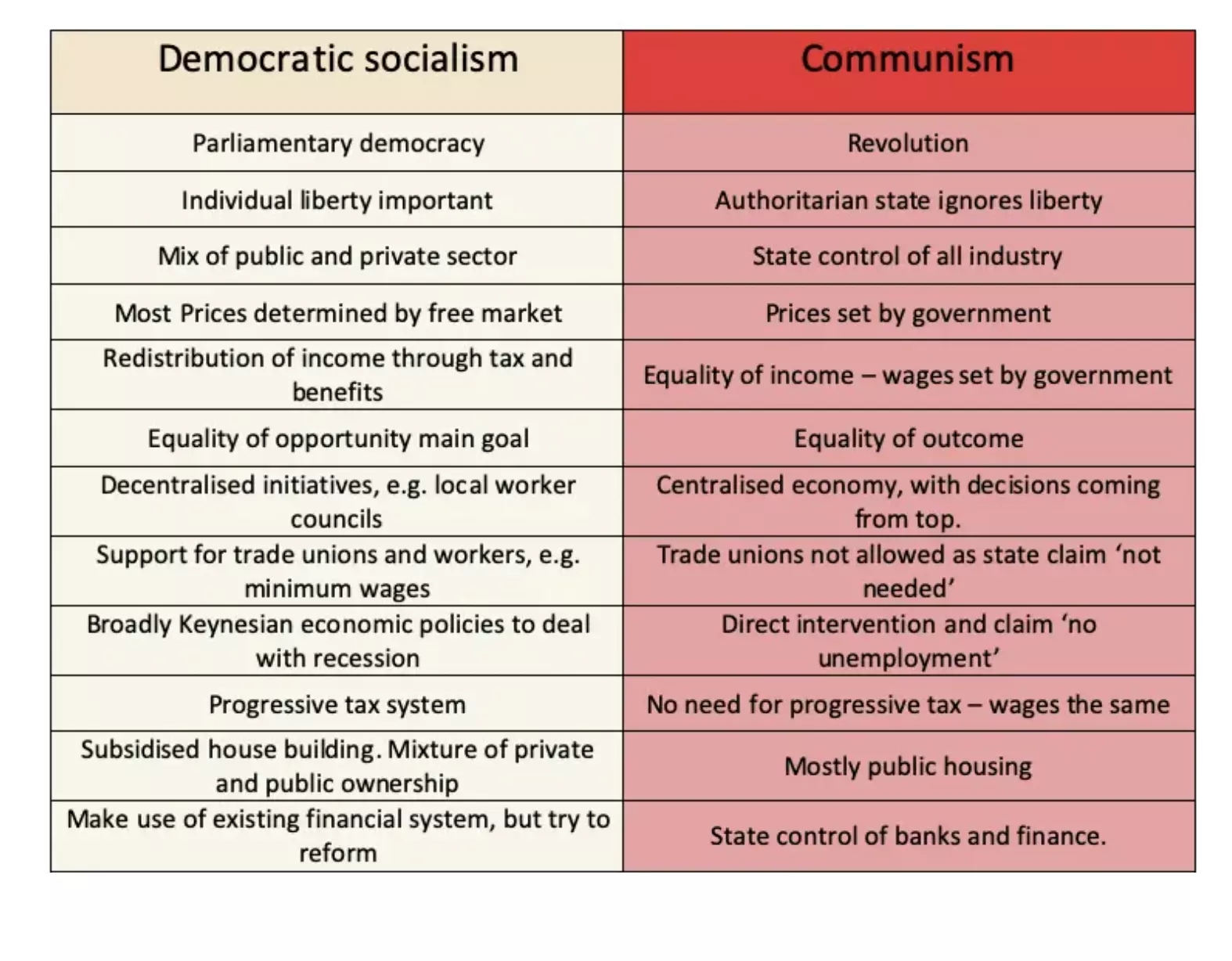
An image showing the symbolism of Socialism and Communism, with the hammer and sickle on a weathered poster.
Socialism Vs. Communism
Socialism and communism both place much value on creating a more equal society and removing class privilege. The biggest difference between them is that socialism is compatible with liberty and democracy, while communism depends on an authoritarian state to create an “equal society” that denies basic liberties.
In the west, democratic socialism involves participation in democracy in order to seek an incremental reduction in inequality. It implies a mixture of private enterprise and public sector intervention.
Communism is closely associated with the Soviet Union and China’s state Communism. It is an economic and political ideology. It attained greater equality through state control of the economy, which often took place at the expense of individual liberty.
Committed socialist George Orwell fought in the Spanish Civil War. He was part of a socialist-anarchist party that sided with the Republican movement. However, Orwell was very critical of the Soviet-backed Communists whose authoritarian actions behaved more like the extreme right.
In Homage to California, Orwell commented that the Communists stood upon the extreme right rather than the extreme left.
What Is Socialism?
There are multiple types of socialism, but democratic socialist parties provide the best guide to socialism in the West. For instance, the UK Labour Party, which won the 1945 General election implemented multiple socialist policies. These policies included:
- Higher income tax for high earners
- The creation of the national healthcare system, which was free at the point of use
- The nationalization of key industries, including gas, electricity, and coal
- The creation of a welfare state in which the unemployed were guaranteed minimum income
- Labor market reforms, like increased protection for trade unions
- The expansion of free education
Socialism most emphasizes equality of opportunity. It uses the state to redistribute income, taking it from the highest earners and giving it to others. However, socialism does not insist on equality. It only aims for equality of opportunity. Democratic socialism, meanwhile, combines private sector enterprise with public sector intervention.
Parties that are traditionally socialist may wish to nationalize key public sector industries, which are natural monopolies. Private firms, though, can operate in the free market. Instead of controlling individual firms, the state puts rules in place to avoid exploiting workers and consumers.
Socialism allows private ownership and private property. Still, it may place certain taxes on inheritance and wealth as a means of redistributing wealth and opportunity.
What Is Communism?
Karl Marx developed the communist economic and political theory. Marx developed the concept of a “Dictatorship of the Proletariat” and argued that the working class should ignore democratic norms and rule in the people’s interests.
In addition, Marx advocated for a revolution. He aimed to overthrow capitalism and create a new economy. In this new economy, the government, instead of private individuals, would own and manage the industry.
Through its 1917 revolution, the Soviet Union managed to achieve a new kind of economy. Lenin, and later Stalin, removed all forms of democracy and cracked down on individual liberty. The lack of individual liberty and freedom was an overriding aspect of the communist society.
The state of the communist Soviet Union became all-powerful in deciding what to produce and how to produce it, setting targets, and managing the economy. There was very little, if any, role left for the free markets and price mechanism.

|
Democratic
Socialism |
Communism |
|
Parliamentary
Democracy. In Western Europe, socialist parties aim to gain power through
democracy and winning elections. |
Revolution. Communist
parties believe power should be exercised by the people rather than a
democracy; they have a general disdain for capitalist democracy |
|
Importance of
individual liberty is high and the state protects free speech and human
rights. |
Authoritarian
state ignores liberty while cracking down on dissent and criticism. |
|
Mix of Public
and Private sectors. Democratic socialism leaves most private industry
unaffected, but may nationalize key industries like transport, electricity,
and gas. |
State control
of all industry. Very limited role for free enterprise; government approval
is required to set up new enterprise. |
|
rices
determined by the free market, with a few exceptions, such as rent control. |
Prices set by
government. The government sets prices and output, which can lead to
surpluses as well as shortages. |
|
Redistribution
of income through tax and benefits , such as unemployment benefits and
progressive marginal income tax rates. |
Equality of
income, with wages set by the government. |
|
The main goal
is equality of opportunity. Democratic socialism supports free public
education as a means to enable everyone to gain qualifications. |
Equality of
outcome. Even those who are more intelligent or work harder should receive
the same wage. |
|
Decentralized
initiatives , like local worker councils and local democracy on small
decisions like new roads. |
Centralized
economy , in which all decisions are made at the highest levels of government. |
|
Support for
trade unions and the right to strike, as well as labor market policies,
including minimum wage and a maximum workweek. |
Trade unions
not allowed as the state says they aren’t needed. There is no right to
strike, as the employer is the government itself. |
|
Broadly
Keynesian economic policies to handle demand management and recessions. |
Direct
intervention in economy, and does not allow unemployment. |
|
Progressive
tax system to redistribute wealth. |
No need for a
progressive tax system, since all wages are the same. |
|
Subsidized
house building , with a mixture of public and private ownership. |
Mostly public
housing , with a very limited scope for privately-owned property. |
|
Uses the
existing financial system , but tries to reform it. |
State control
of finance and banks. |


